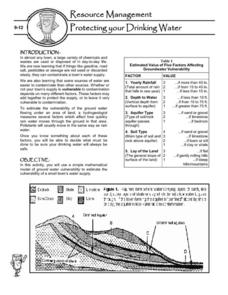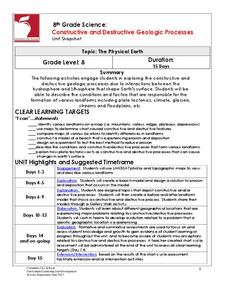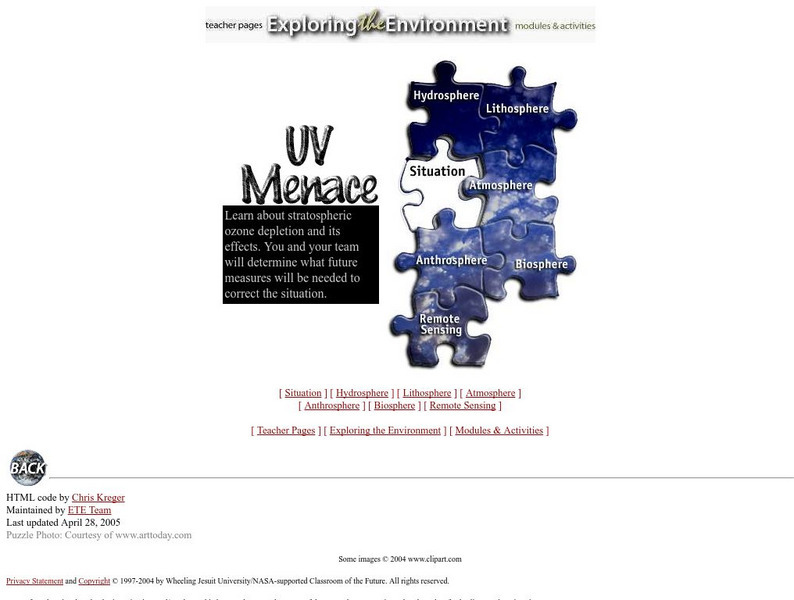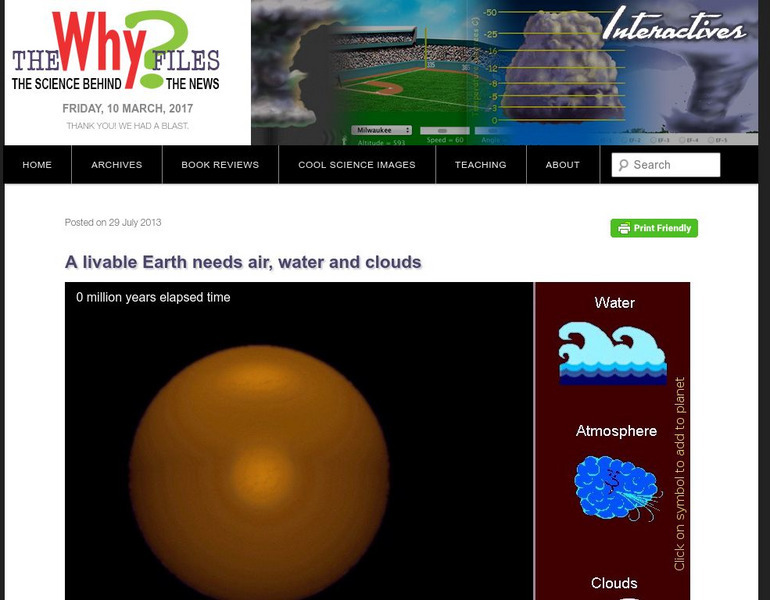US Environmental Protection Agency
Protecting Your Drinking Water
Having a clean, reliable source of drinking water is essential for any community, but in many cases this is easier said than done. Engage young environmentalists in exploring the five factors affecting vulnerability of a groundwater...
Columbus City Schools
Constructive and Destructive Geologic Processes
Show the class the world as they've never seen it before—from way above! Learners try to unravel the mysteries presented by rich satellite imagery, learn to interpret topographic maps, and study erosion by constructing their very...
UNESCO
The Water Cycle
Young scientists get their feet wet as they learn about the water cycle in this series of activities. Whether they are observing how evaporation causes puddles to dry up, or how plants put water into the atmosphere through...
Columbus City Schools
What is Up Th-air? — Atmosphere
Air, air, everywhere, but what's in it, and what makes Earth's air so unique and special? Journey through the layers above us to uncover our atmosphere's composition and how it works to make life possible below. Pupils conduct...
Australian Government
The Great Artesian Basin
Covering 23% of the continent and holding 64,900 cubic kilometers of water, the Great Artesian Basin is the primary source of water for much of inland Australia. Using detailed student worksheets, experiments, and case studies,...
Curated OER
Unit 3: Scientific Writing
Write-on! Demonstrate a writing model and support learners as they write an informational essay on a water resource issue of your (or their) choosing. The lesson plan provides a well-scaffolded summative writing...
National Geographic
National Geographic: Our Hydrosphere
After learning about the Earth's hydrosphere and its major components, students look at the interconnections within the hydrosphere and with humans. Includes a vocabulary list with definitions.
Scholastic
Scholastic: Study Jams! Science: Lithosphere, Hydrosphere, and Atmosphere
A slideshow and a short multiple-choice quiz on the rock surface of the Earth, its water, and the gas layers that surround it.
CPALMS
Florida State University Cpalms: Florida Students: Earth's Spheres
Check out the tutorial which introduces the Earth's spheres. Viewers should be able to identify the Geosphere, Biosphere, Atmosphere, Hydrosphere and Cryosphere and know their differences and similarities.
CK-12 Foundation
Ck 12: Life Science: 12.15 Biosphere
Understand Earth's biosphere which contains the lithosphere, hydrosphere, and atmosphere.
Vision Learning
Visionlearning: Earth Science: The Carbon Cycle: What Goes Around Comes Around
Instructional module focusing on the carbon cycle. Discussion includes the biological and geological components of how carbon moves through the atmosphere, lithosphere, and hydrosphere. Site also includes an interactive practice quiz and...
Center for Educational Technologies
Nasa Classroom of the Future: Environment Module: Uv Menace
This site provides information and activities for classes to learn more about ozone depletion and UV radiation.
PBS
Pbs Learning Media: Kids in Motion: Water Cycle Fitness Lesson Plan
In this lesson, students unite science and physical activity to learn about the water cycle!
E-learning for Kids
E Learning for Kids: Science: Greece: What Is the Earth Made Of?
Dionysus is a Greek God. and a theater director. Help him get ready for the play and learn about land, water, and air. After completing this lesson, students should be able to identify the different materials Earth is made up from (land,...
University of Wisconsin
The Why Files: A Livable Earth Needs Air, Water, and Clouds
Make Earth's climate livable by adding the right amount of air, water, and clouds to its surface and atmosphere.
Other popular searches
- Biosphere and Hydrosphere
- Hydrosphere and Lithosphere
- Lithosphere Hydrosphere
- Hydrosphere +"Atmosphere"
- Hydrosphere "Atmosphere
- Hydrosphere and Atmosphere
- Hydrosphere and Pollution
- Lithosphere, Hydrosphere
- Hydrosphere Atmosphere
- Hydrosphere "Atmosphere"
- Hydrosphere +Atmosphere
- Hydrosphere "Stmosphere













